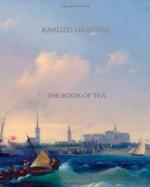
|
| Name: _________________________ | Period: ___________________ |
This test consists of 5 short answer questions, 10 short essay questions, and 1 (of 3) essay topics.
Short Answer Questions
1. Some statesmen, philosophers, and artists of the West could be referred to as what?
2. What represents a harmonious synthesis of these personalities?
3. Okakura was born in 1862 to whom?
4. Who brought the tea to Europe?
5. The person in #60 combined teaism with Confucianism, Taoism, and what other religion?
Short Essay Questions
1. How does Zennism oppose Buddhism?
2. What did Fenollosa and Okakura do together? How and why did their travels together end?
3. What is the history of Taoism and tea?
4. How did tea begin?
5. How is the vacuum used in another art form?
6. What is said about THE BOOK OF TEA and tea at the end of the chapter?
7. When did tea first arrive in the Western world? Who brought it?
8. What was the opinion of tea?
9. Will the West ever truly understand the East? Why or why not? What stereotypes have formed? Are these stereotypes breaking down? Why or why not?
10. What are the three distinct sides of Okakura?
Essay Topics
Write an essay for ONE of the following topics:
Essay Topic 1
There are three eras of tea.
Part 1) What are the three main tea eras? Describe each of them and explain how each of them come to be? How are they connected?
Part 2) How does each era reflect the Japanese culture of the time? Does the tea era influence the culture or does the culture influence the tea era? Explain.
Part 3) How does art in America today reflect life? How has American art evolved to be what it is today?
Essay Topic 2
Stereotypes exist for both the West and the East.
Part 1) Describe stereotypes of each. How have these stereotypes come about? How do they affect the relationships between the East and the West?
Part 2) What does the writing of this book reveal about the stereotypes between the East and the West? What does this reveal about the author's feelings towards the West?
Part 3) What stereotypes exist in your own community? How do these stereotypes come about? How do they affect relationships between various groups in your community? How do these stereotypes affect you?
Essay Topic 3
Man has a very long history with flowers.
Part 1) Describe man's long history with flowers. Why might flowers be important to man? How are flowers attractive to man?
Part 2) What is the Cult of Flowers? How does it reflect Japanese culture and philosophy? How is it connected to teaism?
Part 3) Describe the Western use of flowers. Do Westerners have respect for flowers? Explain.
|
This section contains 844 words (approx. 3 pages at 300 words per page) |

|




